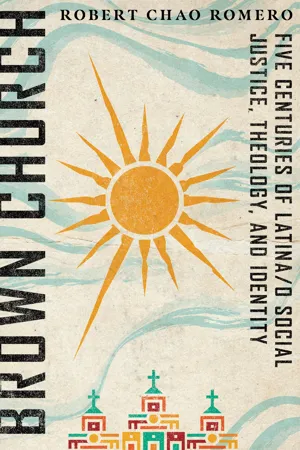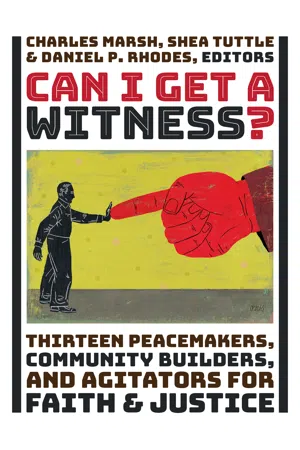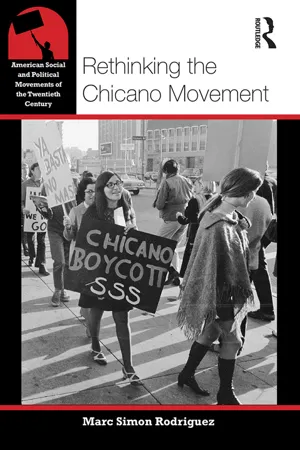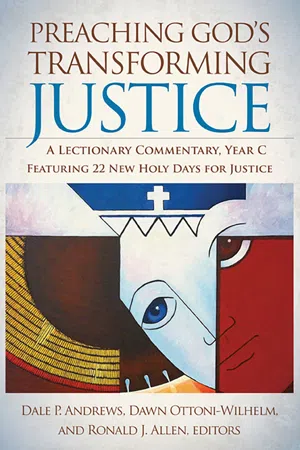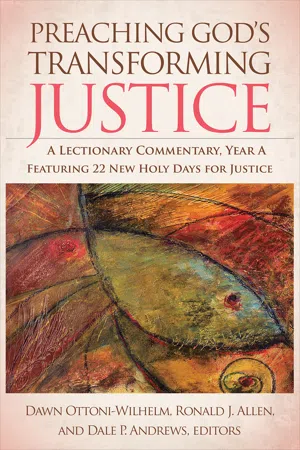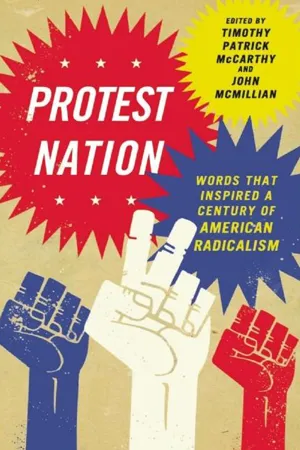Cesar Chavez
Cesar Chavez was a prominent American labor leader and civil rights activist who co-founded the National Farm Workers Association, later known as the United Farm Workers (UFW). He dedicated his life to advocating for the rights of farm workers, leading nonviolent protests and boycotts to improve their working conditions and wages. Chavez's efforts significantly contributed to the advancement of labor rights and social justice in the United States.
6 Key excerpts on "Cesar Chavez"
- eBook - ePub
Brown Church
Five Centuries of Latina/o Social Justice, Theology, and Identity
- Robert Chao Romero(Author)
- 2020(Publication Date)
- IVP Academic(Publisher)
...The Spiritual Praxis of César Chávez C ÉSAR C HÁVEZ WAS the preeminent leader, voice, and public face of the Mexican American Civil Rights Movement of the 1960s. 1 Chávez is to Latinas/os what Rev. Dr. Martin Luther King Jr. is to the African American community. Moreover, as the posthumous recipient of the Presidential Medal of Freedom, the Aztec Eagle, 2 and a US postage stamp in his honor, Chávez has been called the world’s most famous Latino. 3 Together with Dolores Huerta and Filipino organizers Larry Itliong and Philip Vera Cruz, Chávez founded the United Farmworkers of America (UFW). 4 The UFW fought for increased wages and better working conditions for exploited California farmworkers and rose to national attention through the famous Delano grape strike and international boycotts of 1965–1970. Although César Chávez is revered as the most highly regarded Latina/o civil rights icon of the 1960s, his critical role as faith-rooted activist of the Brown Church has been largely overlooked. Most scholars of Chicana/o studies, as well as activists, have ignored the centrality of Christian spirituality in his personal life and the broader farm workers movement. In the words of Chávez, “Today I don’t think I could base my will to struggle on cold economics or on some political doctrine. I don’t think there would be enough to sustain me. For me, the base must be faith.” 5 This chapter explores the spiritual formation and praxis of famed Chicano civil rights leader César Chávez during the famous grape strike of 1965–1970, and highlights his role as the most famous twentieth century community organizer and activist of the Brown Church. Methodologically, it draws from the broad—and disparate—secondary literature on the life of Chávez...
- eBook - ePub
Can I Get a Witness?
Thirteen Peacemakers, Community-Builders, and Agitators for Faith and Justice
- Charles Marsh, Shea Tuttle, Daniel P. Rhodes, Charles Marsh, Shea Tuttle, Daniel P. Rhodes(Authors)
- 2019(Publication Date)
- Eerdmans(Publisher)
...C ESAR C HAVEZ (1927–1993) Cesar Chavez portrait, Forty Acres Headquarters, Delano, CA, 1969. Photo: Bob Fitch Photography Archive, Department of Special Collections, Stanford University Libraries. I N THE U NION OF THE S PIRIT Cesar Chavez and the Quest for Farmworker Justice Daniel P. Rhodes To all appearances, Cesar Estrada Chavez was a rather unimpressive figure. Diminutive in stature, he had a boyish face, a wide, faintly aquiline nose, chestnut skin, and thick onyx-colored hair often neatly parted low on the left side and combed back and to the right across his head. He was handsome but forgettable. That he would organize the first farmworker union in a struggle for justice that took on the industry of agribusiness scarcely seemed possible. The differences could not be starker between Chavez and the heroes of popular Westerns playing during the time that he was organizing farmworkers in southern and central California. Next to a Roy Rogers or a John Wayne, he surely would have seemed unintimidating and even unremarkable. Compared to the great orators of the day—such as Malcolm X or Martin Luther King Jr.—he would have seemed prosaic. Only his eyes offered a clue: they were captivating and intense. He was hobbled by chronic back pain much of his life as a result of years spent working bent over in the fields, bone depletion, and one of his legs being slightly longer than the other, something that would be diagnosed later in his life. Yet this physical fragility and meekness was nearly eclipsed by the calm, fortified nature of his presence. One journalist biographer described him as a person of “density” who “walks as lightly as a fox.” 1 He had a sharp sense of humor, and though he was kind, he could also be acerbic...
- eBook - ePub
- Marc Simon Rodriguez(Author)
- 2014(Publication Date)
- Routledge(Publisher)
...Whether leading protests, marches, or demonstrations in New York City, Austin, Berkeley, or Milwaukee, Chicano youth activists began to tie the demands of the farm workers of California (as well as Texas and the Midwest) to the broader civil rights demands of Chicanos nationwide. While Chavez and his vanguard leadership circle were older than most youth volunteer activists, through cross-pollination with other Mexican American and 1960s-era social movements the youth brought skills learned in other movements to the farm workers’ struggle, and through volunteer activism in the UFWOC they learned new tactics that they put to good use— often simultaneously— in other areas of the Chicano Movement. 47 The national boycott involved grocers, families, and everyday people in an evaluation of working conditions, as empathy for farm workers led many to respond favorably to the boycott. The cause gained pledges of support from the mayors of New York, San Francisco, and Detroit, and many college campuses followed suit. Although the strike gained national attention after 1966, negotiations between growers and the UFWOC remained stalled. Three years into the boycott, California grape growers showed that they were feeling the impact by bringing suit against the UFWOC and five other unions for losses of $25 million because of union efforts to prevent major cities from purchasing nonunion California grapes. The lawsuit revealed that the boycott was working at the national level and altering consumer patterns of purchasing. 48 Cesar Chavez, in the effort to establish the UFWOC as a viable union, became a national civil and labor rights figure. Certainly, Larry Itliong and Dolores Huerta were central to the operation and success of the union, but for most Americans, and for many Chicano activists, Chavez became the iconic leader of the movement. Fashioning his efforts on the social movement and nonviolent tactics of Martin Luther King, Jr...
- eBook - ePub
Preaching God's Transforming Justice
A Lectionary Commentary, Year C
- Dale P. Andrews, Ronald J. Allen, Dawn Ottoni-Wilhelm(Authors)
- 2012(Publication Date)
- Westminster John Knox Press(Publisher)
...10). The nation suffered because of evil actions by their ancestors, which provoked the Lord’s wrath (v. 14). The text promises that the Lord will treat the surviving remnant in a different manner (v. 11), blessing them with prosperity and safety in the future (vv. 12–13). The Lord comforts the people with the words “do not be afraid” (v. 15) and commands the people to speak the truth to one another, render true justice and make peace, stop scheming against one another, and avoid attachment to lies (vv. 16–17). César Chávez’s life testifies to rendering true justice for the sake of authentic peace. For more than thirty years César Chávez lived as a poor man in solidarity with the poorest workers in the United States. He insisted that the heart and soul of the union community was the willingness to live a simple life characterized by voluntary poverty, sacrificial service of others, and nonviolent activism. While many people admired him, many others reviled Chávez. He was denounced and opposed by growers who saw the farm worker movement as a threat to business as usual. His opponents were correct. César Chávez and the United Farm Workers were trying to end business as usual by establishing another way of doing business, a way in which field laborers could share the fruits of their labor and live in dignity as equal and respected members of society. César Chávez had the audacity to believe that farm workers were important human beings: They are important because of the work they do. They are not implements to be used and discarded. They are human beings who sweat and sacrifice to bring food to the tables of millions and millions of people throughout the world. They are important because God made them, gave them life, and cares for them in life and in death. 3 He imagined a world where every worker benefits from a steady job with good wages and decent conditions and lives in dignity as a child of God...
- eBook - ePub
Preaching God's Transforming Justice
A Lectionary Commentary, Year A
- Ronald J. Allen, Dale P. Andrews, Dawn Ottoni-Wilhelm(Authors)
- 2013(Publication Date)
- Westminster John Knox Press(Publisher)
...César Chávez Day (March 31) Frederick John Dalton J OB 30:9–31 P SALM 56 H EBREWS 10:32–39 M ATTHEW 7:7–12 César Chávez Day, March 31, commemorates the birthday of César Chávez (1927–1993), a Mexican American who was moved by the poor working conditions, exploitative wages, and other injustices against Latino and Latina farm workers in the United States. Chávez organized the United Farm Workers, which led to upgrading the quality of life for such workers. In addition to honoring Chávez, this day calls attention to the solidarity needed to correct injustice, especially when injustice is inflicted upon workers. César Chávez Day further celebrates the ways in which Hispanic peoples enrich and strengthen the larger life of North America. When we are really honest with ourselves we must admit that our lives are all that really belong to us. So it is how we use our lives that determines what kind of [people] we are. It is my deepest belief that only by giving our lives do we find life. I am convinced that the truest act of courage, the strongest act of [humanity] is to sacrifice ourselves for others in a totally nonviolent struggle for justice. To be a [human being] is to suffer for others. God help us to be [human]. César Chávez 1 Depending on the kind of physical labor we do to earn a living, life is a hard struggle that may include great suffering. The lectionary readings for this day that marks the birth of César Chávez invite us to reflect on the dignity of women and men, boys and girls, who depend on the strength of their muscles and the stamina of their spirits to provide for the needs of those they love as well as themselves. Today’s readings reveal that pain and violence, fear and oppression, injustice and affliction are transformed by the grace of God into faith, praise, hope, and salvation. 2 Trusting in God is a hard struggle for all of us. Yet we depend on God for every good gift in life...
- eBook - ePub
Protest Nation
Words That Inspired a Century of American Radicalism
- Timothy Patrick McCarthy, John McMillian, Timothy Patrick McCarthy, John McMillian(Authors)
- 2010(Publication Date)
- The New Press(Publisher)
...20. CÉSAR CHÁVEZ Letter From Delano (1969) In his famous “Letter From Delano,” CÉSAR CHÁVEZ explained the United Farm Workers’ (UFW) grievances against the “agribusiness” system that kept workers in poverty and forced them to toil amidst toxic poisons in vineyards. Chávez (1927–1993) was born near Yuma, Arizona, and was a migrant worker for many years before he became a full-time organizer. He served as general director of the Community Service Organization (CSO) in California from 1958 to 1962, and in 1966 he helped create the UFW. With a variety of nonviolent tactics, including strikes, fasts, picketing, and marches, Chávez won many labor victories, including an important one against American table-grape growers in 1970. Modeled in part upon Martin Luther King, Jr.’s, “Letter From A Birmingham Jail,” Chávez’s “Letter from Delano” was originally published in Christian Century magazine, and it drew national attention to the dreadful working conditions on many American farms. SOURCE: César Chávez. “Letter from Delano.” Christian Century. April 23, 1969. SELECTED READINGS: Susan Ferriss, The Fight in the Fields: César Chávez and the Farmworkers Movement (1997). Richard Griswold del Castillo, César Chávez: A Triumph of Spirit (1995). John Gregory Dunne, Delano: The Story of the California Grape Strike (1967). Marshall Ganz, Why David Sometimes Wins: Leadership, Organization, and Strategy in the California Farm Worker Movement (2009). “We are not Beasts of Burden … we are Men” Dear Mr. Barr [President, California Grape and Tree Fruit League]: I am sad to hear about your accusations in the press that our union movement and table grape boycott have been successful because we have used violence and terror tactics. If what you say is true, I have been a failure and should withdraw from the struggle; but you are left with the awesome moral responsibility, before God and man, to come forward with whatever information you have so that corrective action can begin at once...
